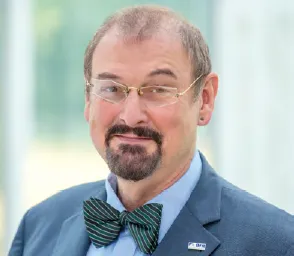Avoiding crises before
they emerge

Andreas Hensel is a veterinarian, microbiologist and hygienist, and has been President of the German Federal Institute of Risk Assessment (BfR) since it was founded in 2002. The institute was established by the legislator in the wake of the BSE crisis as an independent scientific authority, whose key remit is to independently evaluate the safety of food, feed, chemicals and other products. Its findings are primarily used as a basis for safeguarding consumer health. Publishing independent reports on risks is also one of the BfR's responsibilities, in addition to spearheading a multitude of projects around consumer advice. Hensel is a regular guest at QS board of trustees meetings.
Question: BSE, dioxin, rotten meat – do any of these situations make you and your colleagues think you would rather not go into work the next day?
Prof. Dr. Dr. Andreas Hensel: Preventing crises and reporting on these matters is our core purpose. In that respect, no one gets a bad night's sleep. To be honest, there is always a crisis going on somewhere within the various sectors that we assist. There is always an incriminated product or a limit value that has been exceeded. The public does not always perceive it that way, but for the industries that are affected, it sometimes raises existential questions.
Question: Do the actual topics transcend the big crises?
Hensel: Our motto is: Avoid crises before they emerge. We work with the federal states and governments if and when we have reason to believe that a crisis situation could occur and that there is a need – through risk assessments, corresponding communications and rapid action – to prevent a crisis from spreading, whether it turns out to be in the media or the economy. In the meantime, 75 percent of our staff are also employed in approval procedures and other similar activities, i.e. routine processes for genetic engineering, biocides, food additives and feed. This is also part of our statutory mandate.
Question: Has the public perception of crises changed at all over the past 20 years?
Hensel: Fear of losing control is something to which everyone reacts differently based on age-old patterns, for instance by fighting, fleeing or playing dead. Nothing changes here. Ultimately, however, this means that no matter what we communicate, this response mechanism will always run its course.
Question: Ultimately, however, this means that no matter what we communicate, this response mechanism will always run its course.
Hensel: Primordial fear will always kick in, but if we have enough time to instil some reason – which is true for us 99.9 percent of the time because we are not running away from tigers – then we have the opportunity to decide. The question is: How do I react when I believe there is a loss of control? How do I form a decision as a consumer? This depends on the information you have available and your trust in institutions. We can always find objectifiable facts that allow us to educate not only consumers, but also politicians and associations.
Question: Critics may or should, therefore, trust that you and your agency are doing a good job.
Hensel: We are established by law, which means we are independent, and we are not subject to directives. The Bundestag handed us a lot of power in this sense. If citizens are opposed to this or do not trust in our independence, then it is a question of communication. There are many examples of this too. When it came to the glyphosate issue, for instance, some stakeholders doubted our competency, and once they had done so for long enough, citizens got the impression there must be something to it. On the other hand, it is entirely our responsibility to make our position known, even if it does not suit everyone. Our purpose is to be an essential, reliable source of information for the federal government, regardless of who forms that government.


